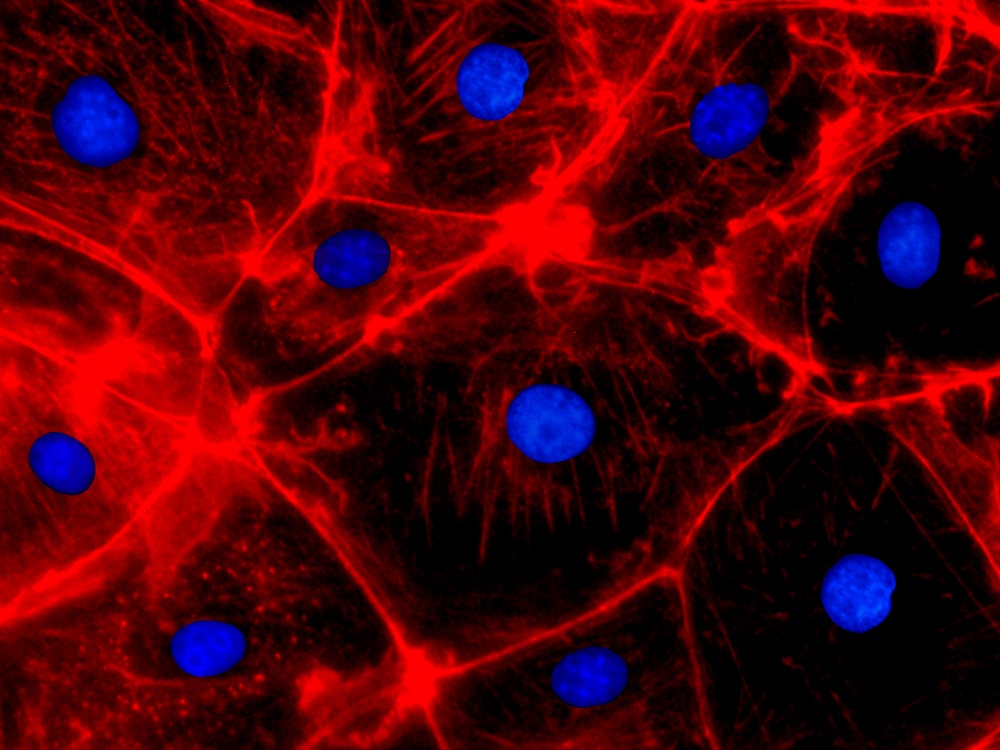Menu
Menu

The mechanisms that regulate gene expression are central to the control of cell development and differentiation, maintenance of cell fate, and adaption to external stimuli.1 Dysregulation of gene expression is a well-documented contributor to the initiation and progression of cancer and other diseases.
1 Genome-Wide Analysis of Gene Expression. Chung DQ and Le Rock KG., Encyclopedia of Biological Chemistry (Second Edition), 2013.
2 An Overview of Methods for Reconstructing 3D Chromosome and Genome Structures from Hi-C Data. Oluwadare O, Highsmith M, and Cheng., Biol Proced Online, 2019.


Epigenetic processes maintain gene expression patterns with a cell. When these processes are disrupted, malignant cellular transformation can occur.1 Recent studies in the field of cancer epigenetics have shown that global epigenetic abnormalities play just as big of a role as genetic mutations in the initiation and progression of cancer.2 Epigenetic aberrations have been reported in blood cancers like mixed lineage leukemia and acute myeloid leukemia (AML) as well as in solid cancers like breast and prostate cancer, leading to the emergence of epigenetic therapies, in combination with other anticancer therapies, as new approach to combating the disease.
High-resolution Hi-C experiments performed on prostate cancer and subclasses of gastrointestinal tumors have identified cancer-specific altered 3D genomic features (topologically associating domains (TADs) and enhancer-promoter loops), that act to drive disease progression.3,4 Such studies pave the way towards the development of novel epigenetic cancer therapeutics.
Dovetail® solutions are uniquely suited to unlocking the role of 3D epigenetics in cancer biology through their unsurpassed resolution, high signal-to-noise, and ease of use. Whether you are taking a whole genome approach with the Dovetail® Micro-C assay, adding the Dovetail® Pan Promoter Enrichment Panel to focus on interactions anchored at gene promoters, or taking a protein-centric view with the Dovetail® HiChIP MNase assay, addition of 3D genomics to your research will take your understanding of cancer into a whole new dimension.
1 Epigenetics in Cancer. Sharma S, Kelly TK, and Jones PA, Carcinogenesis, 2010.
2 Revisiting 3D Chromatin Architecture in Cancer Development and Progression. Feng Y and Pauklin S, Nucleic Acids Res., 2020.
3 A High-Resolution 3D Epigenomic Map Reveals Insights Into the Creation of the Prostate Cancer Transcriptome. Rhie SK, et al., Nat Comm, 2019 Sept.
4 Altered Chromosomal Topology Drives Oncogenic Programs in SDH-Deficient GISTs. Flavahan WA, et al., Nature, 2019.
Chromatin conformation studies in cortical neurons support epigenetic control of enhancers as key players in neurodegenerative diseases.3,4 Increased hypomethylation has been observed in the CpH sites in the prefrontal cortex of patients of individuals with severe Alzheimer's disease (AD) pathology compared to those with mild or moderate pathology. Hi-C studies have identified a distal interaction between hypomethylated enhancers in DSCAMLI and the BACE1 gene promoter which may explain the overexpression of BACE1 in AD pathophysiology. Similar studies will provide insights into other distal enhancer-promoter interactions involved in neurobiology.
Take your understanding of neuronal development and disorders into the next dimension with a whole genome high-resolution neuroplastic map using the Dovetail® Micro-C Assay.
¹Epigenetics, Brain Evolution and Behaviour. Keverne EB and Curley JP, Front Neuroendocrinol., 2008.
2 The Emerging Field of Epigenetics in Neurodegeneration and Neuroprotection. Hwang JY, Aromolaran KA, and Zukin RS, Nat Rev Neurosci, 2017.
3 Epigenetic Dysregulation of Enhancers in Neurons is Associated with Alzheimer's Disease Pathology and Cognitive Symptoms. Li P, et al., Nat Commun., 2019.
4 Epigenomic Analysis of Parkinson's Disease Neurons Identifies Tet2 Loss As Neuroprotective. Lee M, et al., Nat Neurosci., 2020.


Changes in 3D chromatin interactions during differentiation alter up to 36% of active and inactive compartments, indicating topology features are a major player in cell differentiation.² Comparing the 3D genome in IPSC and differentiated cells, such as neuronal stem cells, can help understand how the gain or loss in enhancer and promoter contacts, as well as changes in topological boundaries, commits a stem cell to a particular cell fate. These features, while contributing to our understanding of cell differentiation, likely have significant disease implications in degenerative diseases like Alzheimer's Disease.
Explore the genome wide 3D genome and its contribution to cell differentiation and development using our Dovetail® Micro-C assay or dissect the function of specific protein factors and chromatin marks using the Dovetial® HiChIP MNase assay.
1 Induced Pluripotent Stem Cells and Their Potential for Basic and Clinical Sciences. Ye Le, Swingen C, and Zhang J., Curr Cardiol Rev., 2013.
2 Chromatin Architecture Reorganization During Stem Cell Differentiation. Dixon et al., Nature, 2015.